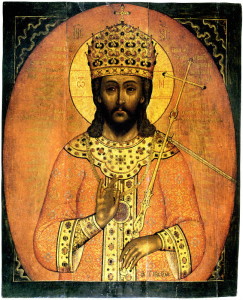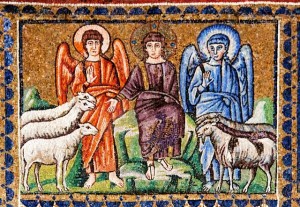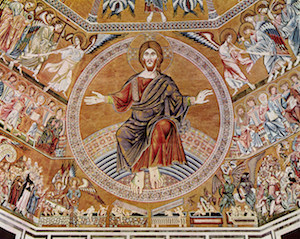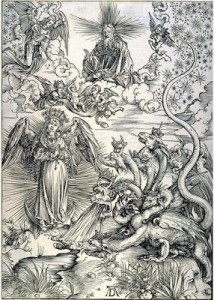Thoughts on Today’s Lessons for Nov. 22, 2015

Christ as King of Kings. Russian icon from Murom (1690)
All of today’s readings show us aspects of God as King, from the mighty celestial ruler imagined in Daniel to John’s vision of the suffering servant Jesus on trial, king of a very different realm. Daniel in these verses portrays God, an Ancient One, hair and gown in snowy white, seated on a fiery throne and served by thousands, judging all humanity and sending out a human messiah to rule as king over all the nations.
Psalm: Psalm 93
Written in an age when earthly kings held real and ultimate power over their people, this mighty hymn of praise portrays God as a king among kings from time before time. Unlike earthly kings, the Psalmist sings, God’s world is certain, immovable and mighty. God’s kingdom will endure, sure and holy, for ever and evermore.
Second Reading: Revelation 1:4b-8
This greeting from the first page of Revelation, that mysterious book that ends the New Testament, gives away its simple secret: This is no strange and frightening prediction of the End Times, nor does it conceal coded information about our times, or any time or place other than seven small churches in what is now Western Turkey, where early Christians suffered under persecution from Rome. The narrative that follows paints a startling image that remains through the ages: Jesus our Savior, God, ruler of all the kings of the earth, coming back with the clouds to deliver justice.
Gospel: John 18:33-37
Jesus, facing the final hours before his death by crucifixion, has been handed over to Pilate, the Roman governor. Soon he will wear a mocking, painful king’s crown made of thorns. But Pilate’s primary concern is political: Has this rabbi declared himself king? This would be an act of treason against Rome’s all-powerful emperor, a capital offense. When Jesus finally answers, clearly and firmly, “My kingdom is not of this world,” Pilate remains puzzled. Jesus stakes his claim to a kingdom and claims his kingship, but “not from here,” adding that he came into the world to testify to the truth.” Here today’s Gospel ends, but we surely remember the next words out of Pilate’s mouth: “What is truth?” Pilate finds no guilt in Jesus, but the crowds will have their way.



 First Reading:
First Reading: